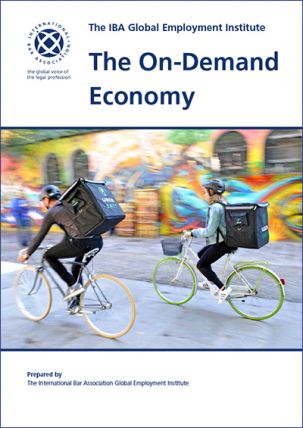A new report from the International Bar Association’s Global Employment Institute urges governments to create legislation for the de facto ‘third category’ of workers engaged in the on-demand economy (ODE) – commonly known as the gig economy - to provide them with greater protection and to boost innovation.
The report says many such workers face a lack of legal protection or insecurity about their rights and obligations, which may lead to exploitation of workers by ODE companies. Entitled The On-Demand Economy, the report recommends ODE workers receive holiday pay while retaining flexible working hours, minimum entitlements to employment protection and access to collective bargaining.

Most jurisdictions only recognise two main categories of worker: the employee and the self-employed or independent contractor. The IBA report says with prominent examples of ODE companies such as Deliveroo, Uber and Amazon Mechanical Turk having disrupted traditional markets, structures and forms of work, and subsequently affected the ways in which businesses provide services, their on-demand workers do not fall into either category. In their operations, these companies usually do not see a place for the traditional restrictions or mandatory requirements of employment law, with many refusing to qualify themselves as employers and their workers as employees. Consequently, ODE workers do not have the same rights as workers classified as employed or self-employed.
“Although the ODE model may possibly create actual or perceived unfair competition for traditional companies, it has opened up a world of opportunities for entrepreneurs who strive for innovation. However, there are some serious discrepancies between the legal rights of ODE workers and those who are treated as traditional employees or self-employed persons. We must address these issues and create an environment where different working styles are not only tolerated, but celebrated,” says Chris Van Olmen, co-author of the report.
